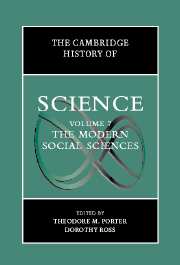Book contents
- Frontmatter
- 1 Introduction: Writing the History of Social Science
- PART I SCIENCES OF THE SOCIAL TO THE LATE NINETEENTH CENTURY
- 2 Genres and Objects of Social Inquiry, From the Enlightenment to 1890
- 3 Social Thought and Natural Science
- 4 Cause, Teleology, and Method
- 5 Utopian Socialism And Social Science
- 6 Social Surveys in the Eighteenth and Nineteenth Centuries
- 7 Scientific Ethnography and Travel, 1750–1850
- 8 History and Historicism
- 9 Bringing the Psyche into Scientific Focus
- 10 Continental Political Economy From the Physiocrats to the Marginal Revolution
- 11 British Economic Theory From Locke To Marshall
- 12 Marx and Marxism
- PART II THE DISCIPLINES IN WESTERN EUROPE AND NORTH AMERICA SINCE ABOUT 1880
- PART III THE INTERNATIONALIZATION OF THE SOCIAL SCIENCES
- PART IV SOCIAL SCIENCE AS DISCOURSE AND PRACTICE IN PUBLIC AND PRIVATE LIFE
- Index
- References
9 - Bringing the Psyche into Scientific Focus
from PART I - SCIENCES OF THE SOCIAL TO THE LATE NINETEENTH CENTURY
Published online by Cambridge University Press: 28 March 2008
- Frontmatter
- 1 Introduction: Writing the History of Social Science
- PART I SCIENCES OF THE SOCIAL TO THE LATE NINETEENTH CENTURY
- 2 Genres and Objects of Social Inquiry, From the Enlightenment to 1890
- 3 Social Thought and Natural Science
- 4 Cause, Teleology, and Method
- 5 Utopian Socialism And Social Science
- 6 Social Surveys in the Eighteenth and Nineteenth Centuries
- 7 Scientific Ethnography and Travel, 1750–1850
- 8 History and Historicism
- 9 Bringing the Psyche into Scientific Focus
- 10 Continental Political Economy From the Physiocrats to the Marginal Revolution
- 11 British Economic Theory From Locke To Marshall
- 12 Marx and Marxism
- PART II THE DISCIPLINES IN WESTERN EUROPE AND NORTH AMERICA SINCE ABOUT 1880
- PART III THE INTERNATIONALIZATION OF THE SOCIAL SCIENCES
- PART IV SOCIAL SCIENCE AS DISCOURSE AND PRACTICE IN PUBLIC AND PRIVATE LIFE
- Index
- References
Summary
Human beings have probably always cultivated knowledge about their own cognitive and affective processes, knowledge that might be called, in the broadest sense of the term, “psychological.” Over the longue durée, such knowledge has been stored, accumulated, and reworked within a variety of discursive pigeonholes, among them philosophy, religion, and literature. But only with the Scientific Revolution and the Enlightenment of the seventeenth and eighteenth centuries did Western Europeans begin to specify the foundations of their hitherto multiform knowledge of the psyche and to codify it with the special kind of rigor called science. Only later still would they attempt to create for it a new, exclusive pigeonhole bearing the name “psychology.” This chapter treats the early phase of the endeavor to bring cognitive and affective processes into scientific focus; it leaves off around 1850, before the advent of concerted efforts to create and institutionalize the unitary academic discipline of “psychology.”
The history narrated here is necessarily a heterogeneous one, a kind of patchwork. This is true not only because of the predisciplinary and hence somewhat inchoate condition of the particular bodies of knowledge that constitute its subject matter, but also because of the approach that the chapter takes to the category of science. A positivist approach would assume that the criteria of scientific knowledge are clear and universal and hence that the history of psychology can and should be narrated as a teleological progress leading from faulty, methodologically unsound propositions to verifiable scientific ones. Such a history would, in other words, possess a distinctive and forceful plot line.
- Type
- Chapter
- Information
- The Cambridge History of Science , pp. 131 - 153Publisher: Cambridge University PressPrint publication year: 2003
References
- 4
- Cited by



